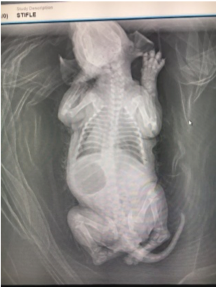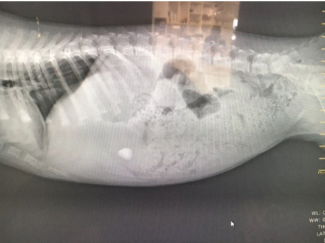
Jack is a little Golden doodle puppy that came to the clinic in August. He was what is called a “Swimmer Puppy”. This means that his back legs would not hold him up, so he just laid down causing his chest to grow flat, pushing his heart and lungs out to the side. There are several possible causes of this syndrome, which include housing them on a slippery surface so they can’t grip the ground with their hind feet, delayed neuromuscular development, rapid growth or neurologic problems.
As you can tell, little Jack was full of life and was adopted by Dr. Ingraham. It took a village of the most wonderful, huge hearted people to help him. It started with Dr. Ingraham’s family. Jack was immediately made part of the family and he was helped by everyone. He was supported, massaged, and cared for by the entire family. He was taken to Alta Dog Rehabilitation and was greeted with open arms by Tena Hosie. She organized a team of specialists to create chest splints to help his chest form more normally, and worked with him for many weeks with slings, massage and exercises to help strengthen his legs.

This is his first radiograph which shows that his heart is pushed to the left side. 
This was Jack when we first started. He was flat and his little legs were crooked and couldn’t hold him up. 
This was one of the first slings that Tena made for Jack.
Jack was doing very well and started walking on his own. He was very weak and wobbly on his hind legs, but he was a fighter, and the team of care givers wouldn’t let him give up.
We then conducted an x-ray of his chest to see how well he was coming along. Surprisingly enough, we saw a big rock in his stomach. He was watched every minute, so the rock was a mystery.

Now Jack was headed to another specialist, Dr. Tucker. She immediately performed an ultrasound and then an endoscopy to try to grab the rock. Unfortunately, it had moved passed the stomach. Luckily, he passed the rock.

He walks normally, his chest is normal, and he can breathe normally. He is beautiful and full of life thanks to the many kindhearted people that dedicated so much time and effort to him.
He is certainly a fighter and he wants to thank with all of his heart Dr. Ingraham’s family, Tena Hosie and her staff, and Dr. Melissa Tucker.
NEVER GIVE UP!!!!!
Diabetes Mellitus
Diabetes is a common disorder that we find in both cats and dogs. It is a disease of the pancreas, an organ which helps our pets digest their food by providing essential enzymes and it produces insulin.
Insulin is required to regulate the level of sugar (glucose) in the bloodstream. Without insulin, the cells of the body cannot absorb glucose. This leads to an excessive amount of glucose in the bloodstream; a problem we call hyperglycemia.
When there isn’t enough insulin, the cells do not get an adequate amount of energy from glucose. This causes the body to start breaking down fat and protein for energy which will cause weight loss and stimulate a ravenous appetite in most pets. The body tries to eliminate excess glucose by urinating it out of the body. To avoid dehydration, the pet drinks more water. This helps to explain why in our diabetic patients we see increased urination, increased thirst, weight loss, and an increased appetite.
To diagnose diabetes, we look for the presence of clinical signs (increased thirst, increased urination, weight loss, etc.) and then we will run a blood test and a urinalysis to detect the amount of glucose in the blood and urine.
We treat diabetes with insulin injections twice daily. Routine monitoring tests are then required to make sure the insulin dose is appropriate for the pet.
Although diabetes in your pet requires a lot of your time, many pets live long and healthy lives with the disease.
If you have questions about diabetes or you are suspicious that your pet has signs of diabetes, please give us a call and schedule an appointment.
(Thank you Dr.Albergo)